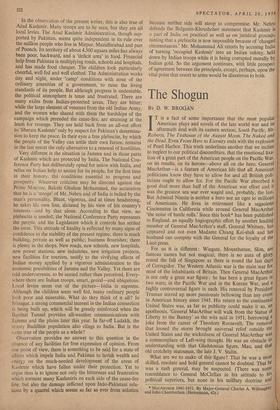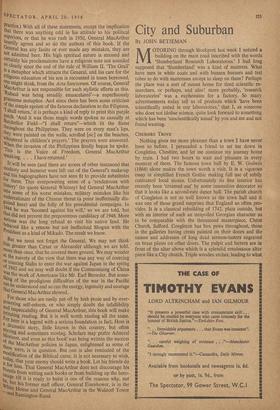The Shogun
BY D. W. BROGAN IT is a fact of some importance that the most popula American plays and novels of the late world war and it aftermath deal with its eastern section; South Pacific, Mr Roberts, The Teahouse of the August Moon, The Naked am the Dead.. Even From Here to Eternity ends with the explosiot of Pearl Harbor. This truth underlines another that we incline to neglect to our political discomfiture, that the emotional fiX8 tion of a great part of the American people on the Pacific Was on its results, on its heroes—above all on the hero, Genera MacArthur—is a feature of American life that all Americas politicians know they have to allow for and all British poll ticians ought to allow for. For the Pacific War absorbed i good deal more than half of the American war effort and i was the, greatest sea war ever waged and, probably, the last But Admiral Nimitz is neither a hero nor an ogre to million of Americans. He lives in retirement like a sagacious Cincinnatus in California while around General MacArthur 'the noise of battle rolls.' Since this book* has been publishes in England, an equally hagiographic effort by another leadini member of General' MacArthur's staff, General Whitney. has appeared and not even Madame Chiang Kai-shek and he' husband can compete with the General for the loyalty of the Luce press.
For us it is different : Wingate, Mountbatten, Slim, ail famous names but not magical; there is no aura of glory round the fall of Singapore as there is round the last day! of Corregidor. The Western Atlantic war is the main war fol most of the inhabitants of Britain. Then General MacArthu' is not only a great war figure : he has been a great figure it two wars; in the Pacific War and in the Korean War, and s highly controversial figure in each. His removal by President Truman stirred up more passionate bellowing than any event in American history since 1945. His return to the continental United States was, as far as publicity could make it so. an apotheosis. 'General MacArthur will walk from the Statue of Liberty to the Battery' as the wits said in 1951, borrowing II joke from the career of Theodore Roosevelt. The removal that loosed . the storm brought universal relief outside the United States and the wickedness of General MacArthur was a commonplace of Left-wing thought. He was an obstacle to understanding with that Gladstonian figure, Mao, and that old crotchety statesman, the late J. V. Stalin. What are we to make of this'figure? That he was a most skilled, resolute and bold general cannot be doubted. That be was a rash general, may be suspected. (There was some resemblance to General McClellan in his attitude to his political superiors, but none in his military doctrine and --- • MACARTHUR 1941-1951. By Major-General Charles A. WilloughbY and John Chamberlain. (Heinemann, 42s.) Practice.) With all of these statements, except the implication that there was anything odd in his attitude to his political superiors, or that he was rash in 1950, General MacArthur heartily agrees and so do the authors of this book. if the General has any faults or ever made any mistakes, they are not admitted here. His high spiritual nature is stressed and certainly his proclamations have a religious note not sounded so clearly since the end of the rule of William II. 'The Grail' is a metaphor which attracts the General, and his care for the religious education of his son is recounted in tones borrowed, one might think, from the Acta Sanctoruni. Of course, General MacArthur is not responsible for such stylistic efforts as this. labaul was being steadily emasculated'—a superfluously gruesome metaphor. And since there has been some criticism °f the simple egoism of the famous declaration to the Filipinos, shall return,' it is perhaps a kind of reply to print this purple Patch. 'And it was those magic words spoken so casually at tiatchellor Field—"I shall return"—which lit the flame t,hroughout the Philippines. They were on every man's lips, they were painted on the walls, scrolled [sic] on the beaches, Whispered in children's prayers.' The prayers, were answered. W,Ilen the invasion of the Philippines finally began he spoke. `ibis is the Voice of Freedom, General MacArthur sPeaking. . . I have returned.'
It will be seen (and there are scores of other instances) that modesty and humour were left out of the General's make-up ;and his hagiographers have not seen fit to provide substitutes Li r them. This overpowering sense of a 'rendezvous with intoIstorY' (to quote General Whitney) led General MacArthur some of his worst mistakes, military mistakes like his Underestimate of the Chinese threat (a point ineffectually dis- guised here) and the folly of his presidential campaigns. In 944 he was 'boomed against his will,' so we are told, but that did not prevent the preposterous candidacy of 1948. More behaved was the long refusal to visit his native land. He president like a remote but not ineffectual Shogun with the rresident as a kind of Mikado. The result we know.
But we must not forget the General. We may not think greater than Casar or Alexander although we are told. more than once, that he covered more ground. We may wonder at the naivety of the view that there was any way of coercing °r Coaxing Stalin to enter the war against Japan in the spring °f 1942 and we may well doubt if the Communising of China histhe work of Americans like Mr. Earl Browder. But some- 8 of the prodigious difficulties of the war in the Pacific can understood and so can the energy, ingenuity and courage that General MacArthur showed. For those who are easily put off by lush prose and by over- Powering,„, self-esteem, or who simply doubt the infallibility imPeccability of General MacArthur, this book will make rtating reading. But it is well worth reading all the same. „ °r here is a legend with a serious foundation in fact. Here is 84,, dramatic story, little known in this country, but often NI;irring and sometimes moving. Scholars may prefer Admiral of the and even as this boot' was being written the success ti; toe MacArthur policies in Japan, enlightened as some of modification were, is in question. But one is also reminded of the ir,dification of the Biblical curse. It is not necessary to wish, ituuf ay. that your enemy should write a book. Let his friends do fri ends him. That General MacArthur does not discourage his in.'nus from writing such books or from building up the hero- Wage till it is ready to burst is one of the reasons why, not hut his former staff officer, General Eisenhower, is in the House and General MacArthur in the Waldorf Tower Remington-Rand.



















































 Previous page
Previous page